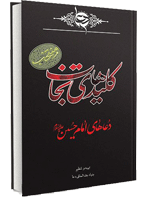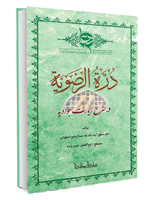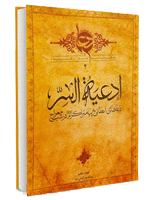- Prophet Muhammad (P.B.U.H&HF): Whenever one of you is needy and brings that to other people, he will not be satisfied. and Whenever someone is needy and brings that to Lord, he shall give him what he wants. sooner or later.
- Imam Sadiq (As.): Whenever you had tenderness in your heart, Pray. because your heart doesn't get tender unless it's pure.
- I told to Imam Baqir (A.S): “What is the meaning of “truly, Ibrahim was awwah and patient”? He replied: “Awwah means (the one who is) praying (to) and wailing (for God) a lot.””
- “Two people, who have acted alike, enter the heaven, but one of them sees the other one in a higher place. Then, he says: O’ Lord! How come has he a superior place in comparison to me while we acted alike? God the Almighty replies: “because he asked Me (whatever he needed) and you did not do that”.
- “The most knowledgeable person to God is the one who asks more from Him”
- “Whoever prays a lot, the angels say: This voice is familiar (to us) and this is the supplication which is accepted and this is the need which is provided”
-
The Holy Prophet (peace be upon him and his Household):
-
وَ لَوْ عَرَفْتُمُ اللَّهَ حَقَّ مَعْرِفَتِهِ لَزَالَتِ الْجِبَالُ بِدُعَائِكُم
If you knew god the way you should’ve known, Mountains definitely will be moved by your supplications. - Crying out of fear of God is the key to his mercy, it’s a sign for his acceptance and it’s a door to answering [supplications]
- Pray to God and believe in his answeres. But understand that God won't accept prays from an unwitting oblivious heart.
Capacity Assessment of Supplication in Preventing Natural Disaster from the Viewpoint of Ayatollah Javadi Amoli
بسم الله الرّحمن الرّحیم
Capacity Assessment of Supplication in Preventing Natural Disaster from the Viewpoint of Ayatollah Javadi Amoli
Authors: Mahdi Ekhlasi, Alireza Majd Ara
Translator and editor: AbdolQhadir Mojahid Ghaznavi
Summary
From the perspective of a religious believer, the agency of the Almighty God is vividly present in all dimensions of their life, encouraging supplication to achieve desired outcomes and ensuring their fulfillment. Therefore, one of the significant issues that captivates the minds of religious thinkers is the analysis and elucidation of the relationship between natural laws as immutable matters and the influence of factors such as supplication as a platform for divine agency in alleviating and repelling natural calamities in the system of creation.
In one viewpoint, the answering of supplications is deemed incompatible with the law of causality and a form of violation of the laws governing nature. Conversely, some argue that the answering of supplications is not contradictory to the laws of nature and is analyzable within the same context. Among them, Ayatollah Javadi Amoli is a scholar who has emerged with a comprehensive view drawn from the Qur'an and reasoning, in analyzing and elucidating the answering of supplications within the framework of natural laws.
In this essay, which reflects his works, an examination of the essence of supplication is first conducted. Then, by explaining the position of causality in the natural order and the relationship between supplication and divine destiny, the analysis of the effectiveness of supplication within the framework of natural laws is explored. The results indicate that the answering of supplications is not only it is not against the laws governing the nature but is indeed in line with the law of causality. However, it should be noted that the cause of certain phenomena is not limited to its known causes, and one can explain the process of answering supplications in the system of causality by influencing supernatural causes.
Keywords: Supplication, Natural Laws, Divine Agency, Divine Destiny, Ayatollah Javadi Amoli.
Introduction
One of the essential points requiring research is the relationship between a believer and the Almighty God in the form of supplication. Although the concept of supplication can be approached from various perspectives, supplication as a request and plea to the Almighty God is the most profound type of supplication that has sparked extensive discussions in the realm of religion. The fulfillment that introduces ambiguity and questions in the process of supplication is the answering that involves the individual through supplication, as it signifies the intervention of His Most-High in the course of natural affairs revolving around the axis of the law of causality. Based on this premise, the answering of supplications implies reaching a desired outcome through a process beyond the natural course, rooted in supernatural factors. From this standpoint, numerous researchers in the field of religion have delved into analyzing the impact of supplication on the natural order, contemplating fate and destiny. Ayatollah Javadi Amoli is one such figure who has made significant efforts in this field, evident in his works such as "Tafsir Tasnim," "Adab Fanay-e Moqarriban," "Rahiq Makhtum," "Tawhid dar Quran," and "Sarchashmeh Andisheh."
Given the diverse approaches of thinkers, investigating the institution of supplication and providing a suitable analysis thereof becomes imperative, as a lack of proper understanding will lead to ambiguities in the belief system. Therefore, it is pertinent to inquire whether supplication and its fulfillment are analyzable within the framework of natural laws or not? How can events be attributed to God within the framework of the law of causality when each part of the natural system is merely a result of natural causal interactions? From the perspective of those who believe in fate and destiny, how can the efficacy of supplication be justified? Regarding the issue, different viewpoints have been expressed by philosophers and theologians, with some denying the laws governing nature and others asserting that supplication violates natural laws through divine intervention. Ultimately, some have come to accept special divine agency and the impact of supplication within the framework of governing causal laws.
The aim of this paper, structured through an analytical-documentary method, is to provide answers to the raised questions by presenting the thoughts of Ayatollah Javadi Amoli. The position of the law of causality in the natural order is initially clarified. Subsequently, the relationship between supplication and divine decree is explored, and finally, the quality of supplication's influence within the natural system is elucidated.
The law of causality
The law of causality, in terms of its background, is the first philosophical issue that has captivated human thought and led them to unravel the mystery of existence. For human having the ability of contemplation, the most significant factor that engages him in thought is the perception of the general law of causality, which prompts the mind to question "why." It suffices to know the importance of this law that some believe that “the law of causality is a fundamental law and its denial leads humans into the valley of skepticism, making it the foundation of all sciences.” In defining the relationship of causality, it is stated: "Causality is a special and intense relationship between two things, where one of them depends on the other for its existence or continuation, naming the cause as the one that necessitates and requires the effect" (Ayatollah Tabatabai). Based on the dependency and connection between cause and effect, two concepts have been elucidated for the cause: first, that "the cause is something from which the existence of another thing arises from its existence and its non-existence from its non-existence" In other words, the cause is that which between it and another thing, there is a concomitance of existence and a concomitance of non-existence.; and second concept is that "the cause is something between which there is a concomitance of non-existence with another thing," meaning that if the cause has ceased to exist, the other thing will also cease to exist, even though there is no existential connection between the two things. This implies that despite the presence of a cause, the existence of another thing may not be possible. Therefore, if the effect exists, the cause also exists, and if the cause exists, the existence of the effect is considered possible (not necessary). The fundamental point in this regard is that the principle of causality is essential, necessary, and exceptionless because it is a rational law and such a law is not exceptionable.
The Position of Causality in the Natural Order
One of the divine principles and traditions in the administration of the world is the flow and reliance on the system of causality and causation. The principle of "causality and causation (cause and effect)" is one of the essential principles and necessities of reason, confirmed by revelation, and it governs the entire system of creation. All material actions and interactions are exclusively dependent on natural causes. In the system of creation, there is no room for chance, coincidence, randomness, or anything considered evil in the material realms. Numerous traditions also attest to the fact that "God, the Almighty has established a cause for everything and His norm is to organize things and actions based on their own causes and according to the order and law of cause and effect." In light of various descriptions found in multiple works, the cosmic system is not a contractual system; in other words, it is not as if God creates a collection of entities and events without any intrinsic or real connection between them and in philosophical terms, the rank of every being in the longitudinal and latitudinal system of the universe is determines the essence of that being." God has established a causal relationship between beings in the system of the universe, where every effect has a specific cause, and every cause has a particular effect; not only can a specific effect be issued directly from any cause and come into existence, but also a specific cause can create any effect directly without an intermediary. In reality, every entity and every object in the cause-and-effect system has a distinct position and a recognizable status. This means that the effect is the result of a specific object, and the cause is another specific object. This embodies the precise concept of "Verily, We have created everything in due measure." (Quran 54:49). Therefore, in the system of creation, every effect is bound by its own cause, follows it in its occurrence and continuation, and obeys its command in essence, attribute, and action. There is no room for arbitrariness in the chain of causality; Neither the cause stops from nobility and generosity, nor the effect refuses submission and obedience. It is worth mentioning that when causality is referred to as a law, it must also be considered immutable. Therefore, the law of creation is not a contract or agreement because it is detached from how things exist and cannot undergo transformation or change; thus, apparent changes observed in the traditions are due to changes in circumstances and each specific tradition must be applicable under specific conditions and should transition to another tradition with changing circumstances. In other words, each tradition has its own applicability and universality under specific conditions. In the world, there is no existence other than laws and unchanging traditions. Humans do not recognize all the laws of the world, nor do they distinguish real laws from pseudo-laws in some cases.
Supplication and Divine Fate and Destiny
Another important aspect to consider in the capacity recognition algorithm is the connection between the knowledge of the Almighty God and the impact of supplication.
Islamic philosophers have offered solutions to this challenge.
In this regard, Ayatollah Javadi Amoli adds: "In the realm of the natural world, which is a place of movement, transformation, and change, 'bada' (change) takes place. This means that God Almighty has decreed that if a supplication, charity, or good deed is fulfilled, a certain task will be accomplished. Furthermore, God knows who is praying and benefiting and who is not praying and remains without benefit. Therefore, there is no ambiguity in God's knowledge or confusion in the world of existence. In other words, there are two aspects here:
1) The limitation of erasure and affirmation; meaning that God has regulated all matters in eternity with their causes and reasons, and one of those causes in the realm of the natural world is supplication, charity, and similar acts. Supplication, which is responsible for bringing about changes in certain matters, is within the realm of erasure and affirmation (Mahw wa Ithbat); not in a realm of immaterial beings or abstracts of fixed and immutable.
2) The realm of the Preserved Tablet (Umm al-Kitab) is the world of pure predestination, necessity, and superiority beyond the limits of change, erasure, and affirmation. In this domain where everything is preserved from alteration, decay, and certain occurrence, acts such as supplication and charity have no effect. Considering the aforementioned, it must be noted that supplication itself is part of predestination; meaning that God has ordained that through supplication, a certain beneficial event will occur, and a harmful event will be averted. In this context, supplication is effective and part of the divine fate and destiny. Therefore, supplication is among the conditions and causes of divine decree and predestination and is like rain preparing the ground to receive divine grace.”
The position of supplication in the systematic order of nature
The position of supplication in the systematic order of nature is significant in Islamic culture. Supplication is considered a genuine need for humans, and this concept aligns with the well-known narration:
أَبَى اَللَّهُ أَنْ يُجْرِيَ اَلْأَشْيَاءَ إِلاَّ بِأَسْبَابٍ، فَجَعَلَ لِكُلِّ شَيْءٍ سَبَباً
"Allah has decreed that things should not happen except by means, so He has made a cause for everything." (Kulayni, Al-Kafi, Vol 1, page 183). This implies that the causer of causes and the real cause of any matter is solely God. In other words, supplication is in harmony with the law of causality and does not contradict the principle of cause and effect. Therefore, acts of goodness such as charity, maintaining family ties, and supplication that have effects in the world are not outside the realm of divine decree and predestination; rather, they are part of the divine plan. God has ordained that through supplication and invocation, certain actions will be undertaken, specific challenges will be resolved, and these acts are part of the laws of the system. Therefore, it is essential to understand that supplication is not about changing the organization of existence but rather about aligning oneself with it through supplication and invocation.
In light of this understanding, Ayatollah Javadi Amoli emphasizes the role of supplication in addressing challenges such as the global pandemic caused by the coronavirus. He invites various segments of society to pray for divine assistance in overcoming this crisis. "The first group that should pray for the relief from the coronavirus are the medical and healthcare staff, and they should ask the Almighty to grant them the knowledge, discovery of medicine, and treatment for the coronavirus. The first supplication session should be held by the medical community of the country, asking God to grant them success in discovering the cure and saving the society in both the East and the West, and for all of humanity to benefit from it. It is better for humans to reach a position where other societies also gather around their table and benefit from it. In the next step, the authorities of the society should pray and supplicate to the divine, asking the Almighty to help them with their unlimited power in providing assistance to the great nation of Iran and the rest of the world despite limited resources. He added, "God is present in broken hearts, and in this situation, the supplications of the affected individuals and their loved ones are very effective. Additionally, the general public should also pray for the removal and prevention of danger from all those affected and the society, so that with the elimination of this disease, society can be governed under the shadow of intellect and justice." Ayatollah Javadi concludes his message by emphasizing, "Supplication plays a crucial role in combating and overcoming the coronavirus disease."
Therefore, supplication, like other actions, is not separate from the law of causes and effects. These causes derive their efficacy from divine decree, and if God intervenes between cause and effect, the cause loses its impact. What is crucial in this context is analyzing the impact of supplication within the framework of the systematic laws of nature and how it functions among causes. However, what's crucial here is examining how prayers influence the orderly laws of nature and their role among various factors, which will be discussed further from two different perspectives.
The concept of the efficacy of supplication in the process of unknown natural causes (the influence of the soul):
Through focus, remembrance, and supplication, individuals develop angelic virtues and become adorned with sacred intellects that elevate them to a position of creative authority and enable them to exert influence over the material universe. Extraordinary phenomena, miracles, and divine blessings manifest through such individuals who possess a sacred soul characterized by divine ethics. All miracles, blessings, and extraordinary occurrences are based on this principle. Therefore, the efficacy of supplication is not contrary to divine norms but one of the causes and factors that leads to transformation and change in the natural world is the soul of a person who is endowed with divine attributes that under God's permission, manipulates or can take the control of the fabric of the universe.
The acceptance of supplications in the process of supernatural causes:
According to Ayatollah Javadi Amoli, God bestows His grace in the order of creation through two main ways: firstly, by using causes and means that are considered by God, and secondly, by directly intervening in a way that goes beyond the usual pattern, where His special grace reaches the recipients without the involvement of typical causes. While most rational sciences follow the first method, the second approach is not dismissed in philosophy and theology, as seen in supplications. Hence, the origin and existence of all things ultimately stem from God.
Conclusion
One of the most profound human needs is the desire to connect with their Creator. God has instilled the practice of prayer in humans, inviting them to engage in it and promising to respond. A significant challenge faced by Islamic and Western scholars is understanding how prayers are answered within the framework of natural laws and causality. Looking at this issue, it can be argued that a fundamental principle in divine governance is its reliance on the system of causality. In this context, the impact of the nature of supplication which is formed within the realm of divine fate and destiny, is also notable. While the supplication algorithm can be analyzed and rationalized through unknown natural causes like the strength from human spirit and soul, emphasizing supernatural elements seems to be more convincing.
References
The Holy Quran
1. Ibn Fares ibn Zakaria (1404 SH): "Maqayis al-Lughah," Qom: Publications of the Office of Islamic Propagation of the Seminary, First Edition.
2. Ibn Manzur, Abu al-Fadl, Jamal al-Din, Muhammad ibn Makram (1414 SH): "Lisan al-Arab," Beirut: Dar al-Fikr for Printing, Publishing, and Distribution, Third Edition.
3. Javadi Amoli, Abdullah (1372 SH): "Concerning the Principle and Return," Qom: Esra, Third Edition.
4. Javadi Amoli, Abdullah (1383 SH): "Monotheism in the Quran," Qom: Esra.
5. Javadi Amoli, Abdullah (1383 SH): "Philosophy of Human Rights," Qom: Esra, Fourth Edition.
6. Javadi Amoli, Abdullah (1384 SH): "Rahiq Makhtum," Qom: Esra.
7. Javadi Amoli, Abdullah (1384 SH): "Source of Thought," Qom: Esra.
8. Javadi Amoli, Abdullah (1384 SH): "Fundamentals of Ethics in the Quran," Qom: Esra, Fourth Edition.
9. Javadi Amoli, Abdullah (1387 SH): "Tafsir Tasnim," Qom: Esra.
10. Javadi Amoli, Abdullah (1388 SH): "Explanation of the Proofs of God's Existence," Qom: Esra, Fifth Edition.
11. Javadi Amoli, Abdullah (1388 SH): "The Art of Nearness Annihilation," No Publisher, Edited by Mohammad Safaei, First Edition.
12. Javadi Amoli, Abdullah 1373 AD: "Rahiq Makhtum," Vol. 2, Al-Zahra Publications.
13. Rafati, Fatemeh and Ebrahimi, Hassan (1393 SH): "The Relationship between Prayer Response and Miracle with the System of Causality from the Perspective of Explainers of Transcendent Wisdom," Philosophical Studies, Number Twenty-Five, pp. 121-141.
14. Sajjadi, Ali Mohammad and Zare, Fatemeh (1393 SH): "The Impact of Prayer on the System of Creation from the Perspective of Three Philosophers (Ibn Sina, Mulla Sadra, and Allameh Tabatabai)," Quarterly Journal of Religious Thought of Shiraz University, Vol. 14, No. 4, pp. 75-102.
15. Shirvani, Ali (1372). "End of Wisdom," Qom: Islamic Propagation Office Publications.
16. Tabatabai, Mohammad Hossein (1363). "Interpretation of al-Mizan," Qom: Society of Seminary Teachers of Qom.
17. Tusi, Mohammad ibn Hasan (n.d.). "Al-Tibyan," Beirut: Dar Ihya al-Turath al-Arabi.
18. Amidi, Hassan (1374). "Amidi Dictionary," Tehran: Amir Kabir Publications.
19. Fuyumi, Ahmad (n.d.). "Al-Misbah al-Munir fi Ghareeb al-Sharh al-Kabir by al-Rafie," Qom: Dar al-Razi, 1st edition.
20. Fakhr al-Razi, Abu Abdullah (1420). "Mafatih al-Ghayb," Beirut: Dar Ihya al-Turath al-Arabi, 3rd edition.
21. Kashfi, Abdul Rasoul and Nabavi Meybodi, Maryam al-Sadat (1389). "Van Promer's Perspective on the Conflict between Prayer and Absolute Divine Knowledge and its Critique from the Perspective of Mohammad Hossein Tabatabai," Ethical Research, Issue 2.
22. Kulayni, Mohammad ibn Ya'qub (1407). "Al-Kafi," Tehran: Dar al-Kutub al-Islamiyya, 4th edition.
23. Kiankhah, Leila (1386). "Investigation of the Conflict between Causality Law and Principle of Uncertainty," Sinawi Wisdom Biannual (Mashkouat al-Nur), Issue 7, pp. 36-37.
24. Latifi, Rahim Latifi and Parimi, Ali (1388). "Miracle and Causality Law," Ayineh Hekmat Journal, Year 1, Issue 2.
25. Motahari, Morteza (1371). "Divine Justice," Tehran: Sadra Publications.
26. Musavi Khomeini, Sayyid Ruhollah (1385). "Interpretations of Philosophy," Tehran: Organization for the Publication of Imam Khomeini's Works.
27. Mulla Sadra (Sadr al-Din Shirazi), Mohammad ibn Ibrahim (1382). "Divine Signs in Ethical Methods," edited by Mostafa Mo'haqiq Damad, Tehran: Hekmat Sabzvari Foundation.
28. Mulla Sadra (Sadr al-Din Shirazi), Mohammad ibn Ibrahim (1381). "Supreme Wisdom in the Four Intellectual Journeys," edited by Ahmad Ahmadi, Tehran: Hekmat Sabzvari Foundation.
29. Mohammadi, Muslim (1389). "Solving the Mystery of Evil in the Works of Ayatollah Javadi Amoli," Esra Journal, Year






